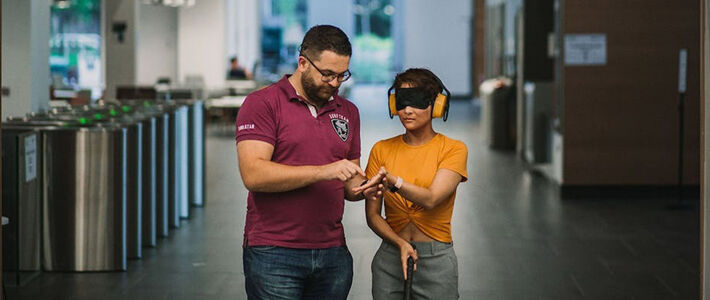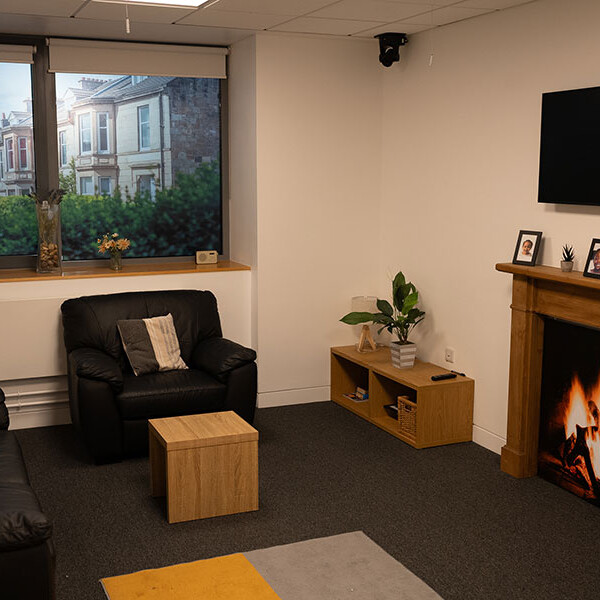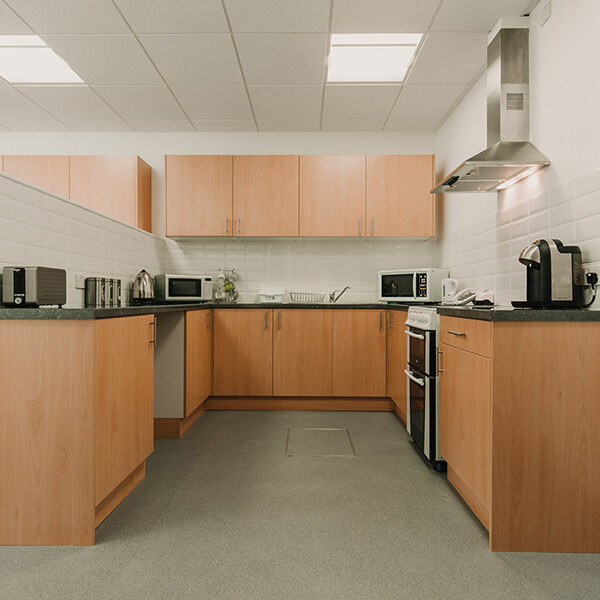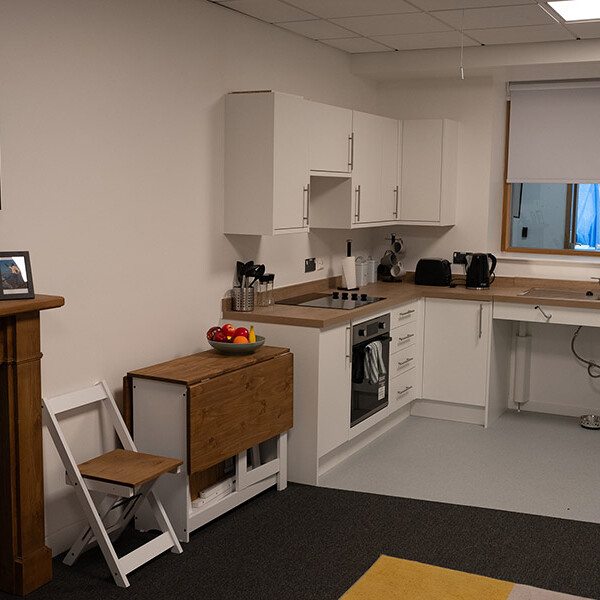
Specialist Complex Needs Rehabilitation Work (Visual Impairment) (Top-up) - BSc (Hons)
Currently viewing course to start in 2025/26 Entry.
If you are a qualified Rehabilitation Worker for Vision Impairment and you wish to take your expertise to the next level, then this top-degree course is for you....
- Level Undergraduate
- Study mode Full Time/Part Time
- Award BSc (Hons)
- Start date September 2025
- Fees View course fees
- Subject
- Location City South
This course is:
Overview
If you are a qualified Rehabilitation Worker for Vision Impairment and you wish to take your expertise to the next level, then this top-degree course is for you. Based at our recently extended £71 million City South Campus in Edgbaston, Birmingham, you will develop specialist techniques to enhance your current practice with adults who have a wide range of complex needs including deafblindness, dementia, mental health conditions and learning disability.
What's covered in this course?
Students who have successfully completed the Foundation Degree in Rehabilitation Work (Visual Impairment) or equivalent can continue their studies to achieve a BSc (Hons) in Specialist Complex Needs Rehabilitation Work (Visual Impairment).
Your first module will concentrate on working with people who have dementia or mental health conditions. In this online module you will focus upon key strategies for working with this group. Also, you will study a range of broader topics such as mental capacity.
There is a double module dedicated to up-skill and equip you to deliver specialist assessment and service provision for working with people who are Deafblind. This module is in line with the statutory requirements outlined in the Care Act 2014 in relation to conducting specialist Deafblind assessment and service provision. You will establish competence with appropriate techniques to facilitate communication, access to information and movement, orientation and mobility. This module takes a practical approach and involves work with people who are Deafblind in teaching sessions and assessments.
You will learn key techniques for working with people who have a vision impairment and a learning disability or autism. Particular attention will be focused on specialist assessment approaches, travel training techniques, independent living skills and incorporating positive behaviour strategies in your practice.
The course encompasses a range of key concepts will be examined that are pertinent to enhancing vision impairment rehabilitation work practice within a multi-disciplinary setting. You will explore skills from counselling techniques, Cognitive Behavioural Therapy and evidence based practice.
Why Choose Us?
- Excellent reputation – our excellent student satisfaction scores reflect the quality of our teaching and our commitment to placing students at the heart of everything we do. The FdSc Rehabilitation Work course achieved a 100% satisfaction score in the 2015 and 2016 National Students Survey.
- The course is unique - this is the only specialist complex needs top up degree in the UK designed specifically for qualified Rehabilitation Workers
- Designed by the sector - the course content has been driven by market research based on the training needs of qualified Rehabilitation Workers
- You will be taught by specialists – this course is delivered alongside experienced external lecturers from other fields of expertise and specialist academics from within the University
- Underpinned by Government legislation and policy - the introduction of the Care Act 2014 has stipulated the need for practitioner development, in particular in relation to specialist assessment and service provision skills for working with people who are Deafblind
- Flexible study - you can choose to study full time over one year, part time over two years or individual modules from the BSc (Hons) course as CPD.
- Recognised by the RWPN - The Rehabilitation Workers Professional Network (RWPN) has recommended the need for qualified Rehabilitation Workers (Visual Impairment) to continually develop their skills and knowledge
- Enhancing professional reputation - Achieving a full BSc (Hons) degree has the potential to place the profession on a par with Social Work and Occupational Therapy.
- Extensive University facilities and support- there are many sophisticated resources from which you can benefit. These include extensive IT services and support, library resources including help with researching, our Personal Development Department for academic support and student services for advice and support on employability, Disability Students Allowance, health and well-being and finance.
Where will I study?
Your lectures and seminars will be held in our recently extended £71 million City South Campus, in Edgbaston – just five minutes from Birmingham City Centre. This stunning campus will provide a learning environment that you love and cutting-edge facilities for you to use, to enhance your skills and understanding.
Entry Requirements
These entry requirements apply for entry in 2025/26.
All required qualifications/grades must have been achieved and evidenced at the earliest opportunity after accepting an offer to help confirm admission and allow for on-time enrolment. This can also include other requirements, like a fee status form and relevant documents. Applicants can track their application and outstanding information requests through their BCU mySRS account.
Essential requirements
The key entry requirement for this programme is the attainment of level 4 and 5 qualifications in Rehabilitation Work (Visual Impairment).
Candidates must hold one of the following:
- Foundation Degree in Rehabilitation Work (Visual Impairment): 240 credits with 120 at level 5
- Diploma in Higher Education in Rehabilitation Studies (Visual Impairment): 240 credits with 120 at level 5
- Foundation Degree in Health and Social Care in Rehabilitation Studies (Visual Impairment): 240 credits with 120 at level 5
Candidates who do not hold one of the above but have evidence of a level 4 certificate (e.g., Rehabilitation Officer Certificate; Mobility Instructor and Technical Officer Certificates) will be required to submit a CPD portfolio (worth up to 60 credits) and successfully complete the level 5 (15 credit) module ‘APL/Advanced Writing Skills’ module with an associated profile of experiential learning worth up to 45 credits in advance of an offer being made.
Applicants will be selected on the basis of the information provided in their application forms and two submitted references.
If you have a qualification that is not listed, please contact us.
Fees & How to Apply
UK students
Annual and modular tuition fees shown are applicable to the first year of study. The University reserves the right to increase fees for subsequent years of study in line with increases in inflation (capped at 5%) or to reflect changes in Government funding policies or changes agreed by Parliament. View fees for continuing students.
Award: BSc (Hons)
Starting: Sep 2025
- Mode
- Duration
- Fees
- Full Time
- 1 year
- £5,160 in 2025/26 ✱ Important note for this price
- Part Time
- 2 years
- £860 per 20 credit module ✱ Important note for this price
(↩Back to price) * The Government is proposing to increase the cap on full-time regulated tuition fees to £9,535 for 2025/26 and the University is planning on increasing fees to that maximum level once legislation is enacted. Part-time fees are charged pro-rata, where applicable.
International students
Sorry, this course is not available to International students.
Application process
Applications to study on the BSc (Hons) top-up course will be made directly to the admissions team. The course starts in September each year and applications will be accepted continually. Applications will be reviewed at the end of each calendar month and applicants will subsequently be contacted by the admissions tutor to arrange a short informal telephone interview. This telephone interview will discuss how you intend to fund the course and mange the studies alongside your other life commitments. Applicants wishing to apply for individual modules will complete the same process.
Applicant visit days and telephone meetings will be offered to prospective applicants. These sessions will provide the opportunity to visit the Faculty, engage in talks about the content and delivery of the course and meet with tutors.
Please apply directly to the University via the online application link.
Download the following documents to apply online:
- Application form
- Guidance for applicants
- Reference form
- Accreditation of Prior Achievement information
This course is not available to International Students
Tel: +44 (0) 121 331 5500
Email: AlliedHealth.admissions@bcu.ac.uk
Personal statement
Your personal statement is a highly important part of your application. It gives you a crucial opportunity to say why you’re applying and why the institution should accept you.
Here are the key areas you’ll need to address:
Course choice
Why does this course appeal? What areas are of particular interest?
Career plans
If you have a specific career in mind, say how your chosen course will help you pursue this goal.
Work experience
Mention any work that is relevant to your subject, highlighting the skills and experience gained.
School or college experience
Highlight skills gained at school/college, eg summer schools or mentoring activities.
Non-accredited skills or achievement
eg Duke of Edinburgh Award, Young Enterprise scheme.
You should also mention your future plans – if you’re planning to take a year out, don't forget to give your reasons. Talk about any subjects you’re studying that don’t have a formal assessment and any sponsorships or placements you’ve applied for. And don't be scared to add in details about your social, sports or leisure interests.
Get more information on writing personal statements.
Course in Depth
Modules
In order to complete this course a student must successfully complete all the following CORE modules (totalling 120 credits).
Through this study you will focus upon key strategies for working with these groups. In addition you will focus upon a range of broader topics such as the impact of complex needs on how the brain works and the implications of mental capacity in rehabilitation work practice. These areas are relevant to work with these groups as well as a wide range of people who have complex needs.
This double module enables you to critically appraise an area of practice in order to develop the ability to make reliable professional judgements. There is flexibility for you to investigate an area in which you have an intrinsic interest and one which will further develop you individual skills set as a specialist practitioner. The module aims to enhance professional decision making skills based on the evidence available.
You will be informed about a range of key skills and concepts pertinent to enhancing vision impairment rehabilitation work practice within a multi-disciplinary setting. Study will involve investigation of a broad range of skills from counselling techniques, Cognitive Behavioural Therapy and brief solution focused therapy. In addition, you will assess the application of concepts such as emotional intelligence and psychological theories of motivation to enable you to become a specialist practitioner. There will also be a focus on enabling you to concentrate on your individual leadership capabilities. These approaches will support you in becoming a more effective team player and enable you to lead within a wider multi-disciplinary setting.
A person is termed Deafblind if they have a combined sight and hearing loss, dual sensory loss/impairment, Deaf vision impaired or blind hard of hearing. This module aims to up-skill and equip students with an in-depth foundation of knowledge concerning the associated impacts on daily life for people who are Deafblind. You will develop competence with appropriate techniques to facilitate communication, access to information and movement, orientation and mobility. You will acquire the expertise to inform your teaching practice within a vision impairment Rehabilitation Work setting when delivering assessment and service provision to people who are Deafblind.
This double module is in line with the statutory requirements concerning specialist Deafblind assessment and service provision as outlined by the Care Act 2014.
This module will build upon your knowledge of clients with learning disability and those with autistic spectrum disorders. You will focus on how to formulate and deliver rehabilitation assessment and service provision to enable independence in daily living. Embedding the module's knowledge and practical approaches will offer qualified practitioners greater confidence and competence in their professional practice.
You will engage with online learning materials on a dedicated module Moodle web page. Resources will be released to you weekly to guide your progress and to allow you to study at a time that is convenient for you. Materials will include video presentations and guided learning activities. Live interactive online discussion forums on Microsoft Teams will allow you to discuss key concepts directly with module tutors and support your preparation for the assessment.
Download course specification
Download nowCourse structure
To be awarded the full BSc (Hons) top up degree you will study all the course modules.
You have the option of taking the full 120 credits (level 6) course or studying individual modules that can be worth 20 or 40 credits depending on the module chosen. You may be able to complete the Accreditation of Prior (Educational) Learning (AP(E)L) application process to have these credits recognised as part of the BSc (Hons) top-up degree course. In addition, there will be a requirement for students studying individual modules to complete an induction prior to the start of the module dates. Please note that the study of individual modules will often start with online tasks prior to the face to face teaching.
The course consists of 4 modules that are delivered sequentially full time over one year or part time over two years.
The BSc (Hons) Specialist Complex Needs Rehabilitation Work (Visual Impairment) top up degree may be studied full-time over one year or part time over two years. The programme comprises of a blend of face to face teaching at the university and guided online study. It is made up of two double modules and two single modules. You will attend one block learning week for the deafblind module. The other modules are online.
Teaching will be provided by the programme team, external specialists and lecturers from associated programmes delivered at Birmingham City University. You will be able to benefit from the specialist expertise of practitioners from the fields of social work, learning disability nursing, counselling and psychology. In addition, the rehabilitation lecturing team who will support your learning have extensive experience in rehabilitation and habilitation, service delivery and management and statutory and non-statutory working as well as significant experience in teaching in higher education.
Face -to-face sessions involve interactive lectures, group discussions, and application of practical skills, case study analysis and challenging simulation exercises. These sessions are designed to link directly to your day to day practice as a Rehabilitation Worker so that you can enhance your confidence with implementing new techniques in your employed roles.
Assessments include written assignments, portfolios, vivas, individual presentations and practical assessments designed to demonstrate competency in the delivery of key skills.
Tutorial support involves face-to-face individual tutorials available in group learning weeks as well as telephone/email contact and online forums in-between attendance at University
Employability
Enhancing your employability
With the successful completion of the BSc (Hons) Specialist Complex Needs Rehabilitation Work (Visual Impairment) course you will gain specialist expertise which should make you a more adaptable and versatile worker.
The application of new techniques to your practice should extend your competence and confidence to deliver a higher quality of service to a wider range of people with complex needs. In addition, the top up degree will enable you to be in lie with the statutory requirements of the Care 2014 in relation to providing specialist Deafblind assessment and service provision.
These attributes should make graduates more desirable within the employment market and enhance promotion prospects within Local Authorities and Voluntary organisations. Attainment of an honours degree is also often desired by employers advertising for supervisory or managerial roles.
Facilities & Staff
We have invested over £400 million in our facilities, including an upgrade to our Skills and Simulation facilities at City South Campus. We boast up-to-date, innovative facilities that simulate the real situations that you may come across in the workplace. These resources are essential in offering you a hands-on introduction to health and social care practice.
Home Environment Room
This space is used to simulate non-clinical settings, as not everything health professionals deal with is hospital based. This is used for simulations of activities such as home visits, home births and supporting people to become independent in their own home.
Assisted Living Space
This space replicates a flat and is used for scenarios such as home visits. The sitting room area provides a different space to practise skills and simulations and work with service users and other students.
Assisted Kitchen
This specially designed kitchen has different areas where you can practice cooking, cleaning, boiling the kettle etc., with someone who has actual or simulated vision impairment. There are adapted devices to help, and simulation glasses for you to wear to experience vision impairment.
Our staff
Peter Cooke
Senior Lecturer/Admissions Tutor
Peter’s connection with the vision impairment sector began following his diagnosis of Retinitis Pigmentosa when he was 15 years old. Early volunteering experience working with children and young people fostered an intrinsic interest in developing a career involving work with those living with serious sight loss.
More about PeterSusan Cadby
Senior Lecturer in Rehabilitation Work
Susan is a qualified Rehabilitation Worker. Studying rehabilitation work was a natural progression from her studies in deaf studies and linguistics.
More about Susan






